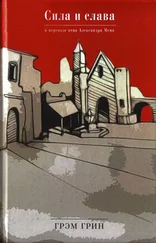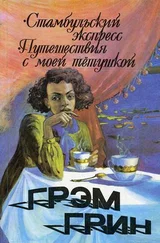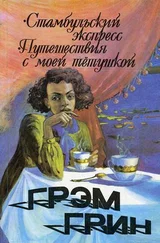Грэм Грин - The Comedians
Здесь есть возможность читать онлайн «Грэм Грин - The Comedians» весь текст электронной книги совершенно бесплатно (целиком полную версию без сокращений). В некоторых случаях можно слушать аудио, скачать через торрент в формате fb2 и присутствует краткое содержание. Год выпуска: 1966, Жанр: Классическая проза, на английском языке. Описание произведения, (предисловие) а так же отзывы посетителей доступны на портале библиотеки ЛибКат.
- Название:The Comedians
- Автор:
- Жанр:
- Год:1966
- ISBN:нет данных
- Рейтинг книги:3 / 5. Голосов: 1
-
Избранное:Добавить в избранное
- Отзывы:
-
Ваша оценка:
- 60
- 1
- 2
- 3
- 4
- 5
The Comedians: краткое содержание, описание и аннотация
Предлагаем к чтению аннотацию, описание, краткое содержание или предисловие (зависит от того, что написал сам автор книги «The Comedians»). Если вы не нашли необходимую информацию о книге — напишите в комментариях, мы постараемся отыскать её.
The Comedians — читать онлайн бесплатно полную книгу (весь текст) целиком
Ниже представлен текст книги, разбитый по страницам. Система сохранения места последней прочитанной страницы, позволяет с удобством читать онлайн бесплатно книгу «The Comedians», без необходимости каждый раз заново искать на чём Вы остановились. Поставьте закладку, и сможете в любой момент перейти на страницу, на которой закончили чтение.
Интервал:
Закладка:
I said, 'The dog doesn't like me.'
'Don Juan?' He rapped out an order to the miserable creature, which began to lick his shoe.
I said, 'I have a companion,' and signalled to Jones.
The ambassador watchedwith despairing incredulity the appearance of Jones. He must still have thought that I intended to confess all and perhaps demand the break-up of his marriage, and what part, he probably demanded, could 'she' play in the affair; was she a witness, a nurse to look after Angel, a substitute wife? In a nightmare anything, however cruel or grotesque, is possible and this to him was certainly a nightmare. First out of the car came the heavy rubber-soled shoes, a pair of socks striped in scarlet and black like a school-tie worn in the wrong place, then fold after fold of blue-black skirt, and last the head and shoulders wrapped in a scarf, the Remington-white face and the provocative brown eyes. Jones shook himself like a sparrow after a dust-bath and advanced rapidly to join us.
'This is Mr Jones,' I said.
'Major Jones,' he corrected me. 'I'm glad to meet you, Your Excellency.'
'He wants asylum here. The Tontons Macoute are after him. There's not a hope of getting him into the British Embassy. It's too well guarded. I thought perhaps … although he is not a South American … He is in extreme danger.'
A look of enormous relief spread over the ambassador's face while I spoke. This was politics. This he could deal with. This was everyday. 'Come in, Major Jones, come in. You are very welcome. My house is at your disposition. I will wake my wife at once. One of my rooms shall be prepared.' In his relief he threw his possessive articles around like confetti. Then he closed, locked, bolted and chained the door, and absent-mindedly offered his arm to Jones to escort him into the house. Jones took it and moved magnificently across the hall like a Victorian matron. The horrible grey dog swept the ground beside him with his matted hair, smelling at the fringe of Jones's skirt.
'Luis!' Martha stood on the landing and looked down at us with sleepy amazement.
'My dear,' the ambassador said, 'let me introduce you — this is Mr Jones. Our first refugee.'
'Mr Jones!'
'Major Jones,' Jones corrected them both, lifting the scarf from his head as though it were a hat.
Martha leant over the banisters and laughed; she laughed till her eyes filled with tears. I could see her breasts through her nightdress and even the shadow of her hair, and so, I thought, could Jones. He smiled up at her and said, 'In the women's army, of course,' and I remembered the girl called Tin Tin at Mиre Catherine's who, when I asked her why she liked him, had said to me, 'He made me laugh.'
2
There was not much of the night left for me in which to sleep. As I returned to the Trianon the same police officer who had boarded the Medea stopped me at the entrance to the drive and demanded where I had been. 'You know that as well as I do,' I said, and he searched my car very thoroughly in revenge — a stupid man.
I rummaged in the bar for a drink; but the ice-containers had been left dry, and there was only a bottle of Seven-Up remaining on the shelves. I laced it heavily with rum and sat out on the verandah to wait for the sun to rise — the mosquitoes had long ceased to trouble me, I was stale and tainted meat. The hotel behind me seemed emptier than it had ever done before; I missed the limping Joseph as I might have missed a familiar wound, for perhaps unconsciously I had ached a little with him in his halting progress from the bar to the verandah and up and down the stairs. His footstep was at least one I could easily recognize, and I wondered in what waste of mountain it was sounding now, or whether he was dead already among the stony knobs of Haiti's spine. It seemed to me the only sound to which I had ever had the time to become accustomed. I was filled with self-pity, sweet like the bourbon biscuits of Angel. Could I yet separate even the sound of Martha's footsteps, I asked myself, from another woman's? I doubted it, and certainly I had never learnt to know my mother's before she left me behind with the fathers of the Visitation. And my real father? He had deposited not so much as one childish memory. Presumably he was dead, but I wasn't sure — this was a century in which old men lived beyond their time. But I felt no genuine curiosity about him; nor had I any wish to seek him out or find his tombstone, which was possibly, but not certainly, marked with the name Brown.
Yet my lack of curiosity was a hollow where a hollow should not have been. I had not plugged the hollow with a substitute, as a dentist puts in a temporary filling. No priest had come to represent a father to me, and no region of the earth had taken the place of home. I was a citizen of Monaco, that was all.
The palms had begun to detach themselves from the anonymous darkness; they reminded me of the palms outside the casino on that blue artificial coast where even the sand was an importation. A faint breeze stirred the long leaves, which were serrated like the keyboard of a piano; the keys were depressed two or three at a time as though by an invisible player. Why was I here? I was here because of a picture-postcard from my mother which could easily have gone astray — no odds at any casino could have been higher than that. There are those who belong by their birth inextricably to a country, who even when they leave it feel the tie. And there are those who belong to a province, a county, a village, but I could feel no link at all with the hundred or so square kilometres around the gardens and boulevards of Monte Carlo, a city of transients. I felt a greater tie here, in the shabby land of terror, chosen for me by chance.
The first colours touched the garden, deep green and then deep red — transience was my pigmentation; my roots would never go deep enough anywhere to make me a home or make me secure with love.
Chapter II
1
THERE were no longer any guests in the hotel; when the Smiths departed, the cook who had made my kitchen famous with his soufflйs gave up all hope and moved to the Venezuelan Embassy, where at least there were a few refugees to feed. For my meals I would boil myself an egg or open a tin, or share the Haitian food with my last remaining maid and the gardener, or sometimes I would have a meal with the Pinedas, not often, though, for the presence of Jones irritated me. Angel now went to a school organized by the Spanish Ambassador's wife, and in the afternoons Martha would drive quite openly up the Trianon drive and leave her car in my garage. The fear of discovery had left her, or perhaps a complaisant husband now gave us a limited freedom. In my bedroom we would pass the hours making love or talking and only too often quarrelling. We even quarrelled about the ambassador's dog. 'It gives me the creeps,' I said. 'Like a rat wearing a wool-shawl, or a long centipede. What induced him to buy it?'
'I suppose he wanted company,' she said.
'He has you.'
'You know how little he has of me.'
'Have I got to feel sorry for him too.'
'It wouldn't do any of us harm,' she said, 'to feel sorry for someone.'
She was more astute than I at seeing the distant cloud of a quarrel when it was still no bigger than a man's hand, and she would usually take the right avoiding action, for when an embrace was over the quarrel was usually over too — for that occasion at least. Once she spoke of my mother and their friendship. 'Strange wasn't it? My father was a war-criminal and she was a heroine of the Resistance.'
'You really think she was?'
'Yes.'
'I found a medal in a piggy-bank, but I thought it might be the memento of a love-affair. There was a holy medal in the pig too, but that meant nothing — she was certainly not a pious woman. When she left me with the Jesuits it was for convenience only. They could afford an unpaid bill.'
Читать дальшеИнтервал:
Закладка:
Похожие книги на «The Comedians»
Представляем Вашему вниманию похожие книги на «The Comedians» списком для выбора. Мы отобрали схожую по названию и смыслу литературу в надежде предоставить читателям больше вариантов отыскать новые, интересные, ещё непрочитанные произведения.
Обсуждение, отзывы о книге «The Comedians» и просто собственные мнения читателей. Оставьте ваши комментарии, напишите, что Вы думаете о произведении, его смысле или главных героях. Укажите что конкретно понравилось, а что нет, и почему Вы так считаете.



